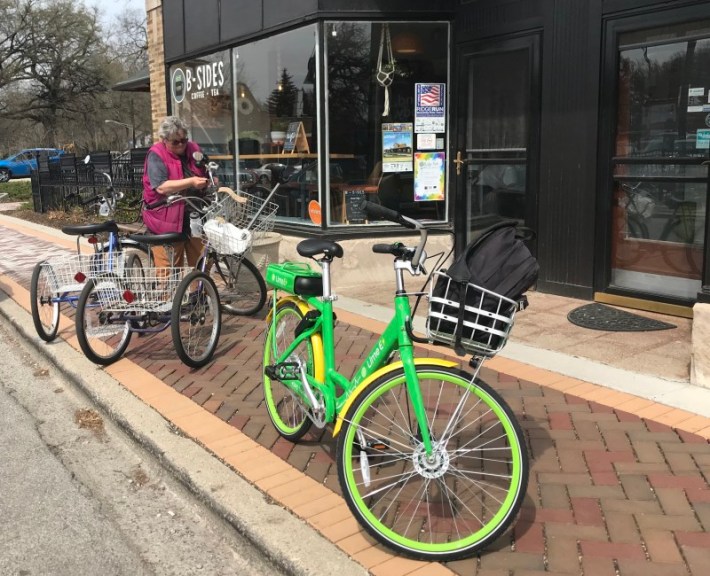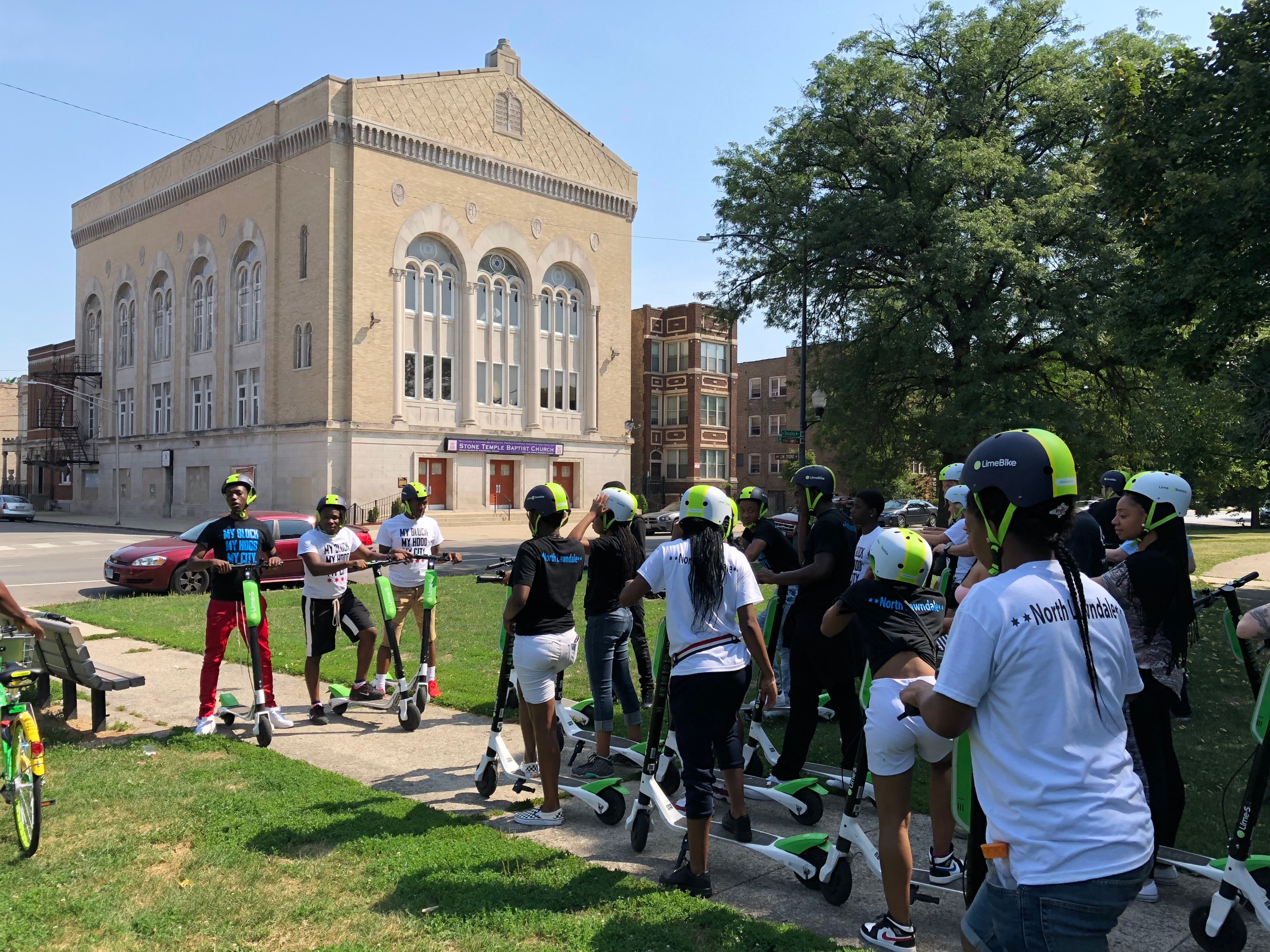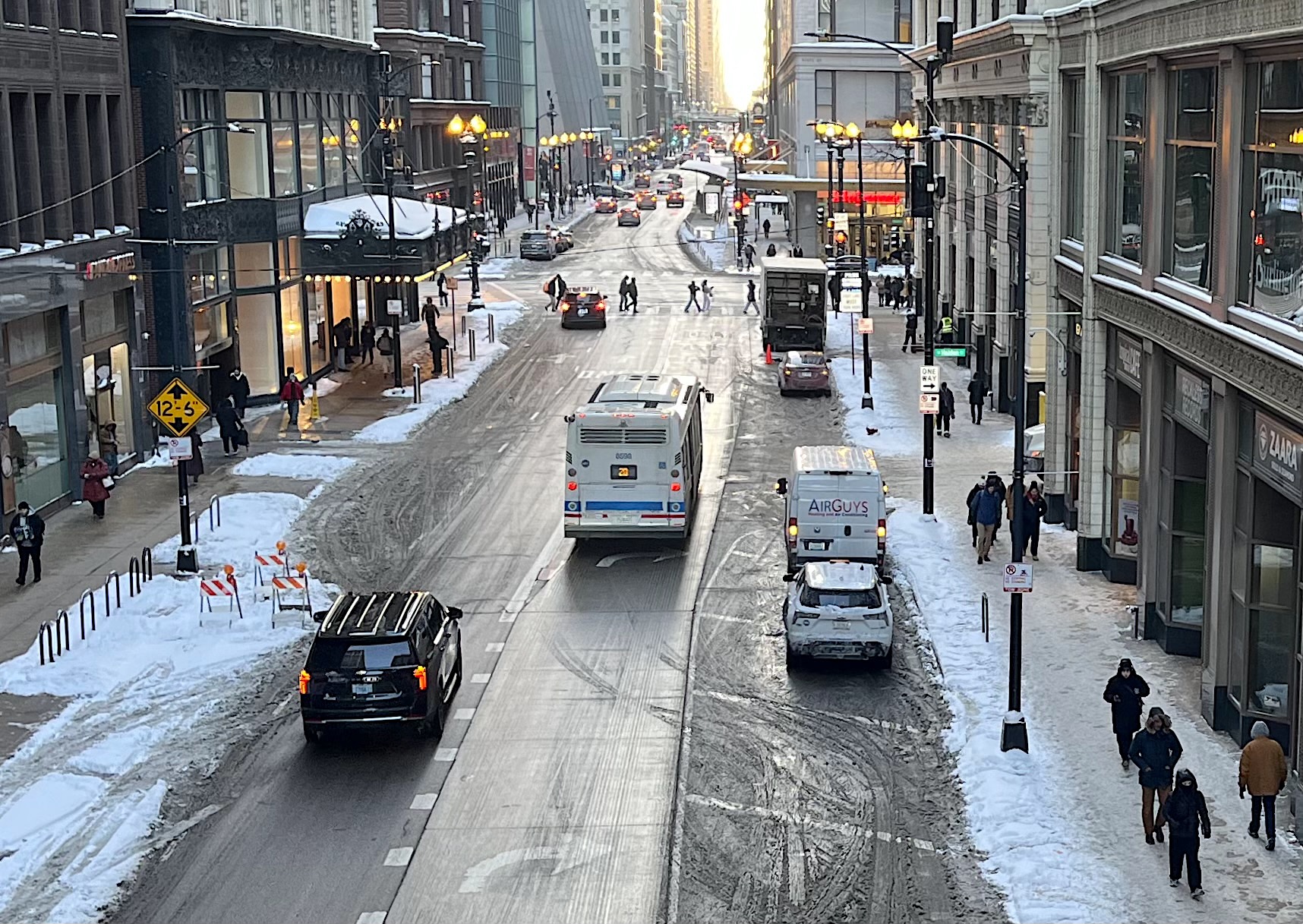The San Francisco-based dockless electric scooter and dockless bike (DoBi) company Lime is taking an interesting step to encourage the next mayor and crop of City Council representatives to be friendly to their business model. Partnering with the Far South Side bike group We Keep You Rollin’, the firm is sending a questionnaire, with somewhat leading questions, asking mayoral and aldermanic candidates if they will support allowing large numbers of the mobility devices to be distributed across the entire city.
Dockless scooters and bikes have been controversial due to cases of companies deploying the vehicles without getting permission from city governments. There's also the potential for sidewalk blockage from poorly parked vehicles, and vandalism of the devices, which creates eyesores, has been fairly common in other cities. (The ill-fated rollout of DoBi in Dallas was a worst-case scenario.) Residents have also complained about scooters being ridden fast on sidewalks, endangering pedestrians.
On the other hand, proponents argue that the technology could help replace car trips, particularly via scooters, which offer a zippy, exercise-and-sweat-free ride that appeals to a new segment of the population that isn’t interested in pedaling a bike for transportation. Dockless bikes and scooters are also easy to deploy anywhere, which could help address geographic equity concerns in cities like Chicago where the docked systems still don’t serve all residents.
But many city officials are also worried that successful docked bike-share systems like Divvy could be driven out of business by DoBi and scooter service, which is artificially cheap because it’s propped up by venture capitalists with many millions of dollars to burn. It could be a similar phenomenon to how venture capital-subsidized Uber and Lyft are currently killing off the taxi industry and causing a nationwide decline in transit ridership.
(While Divvy was recently purchased by venture-capital-backed Lyft, the city of Chicago is also on the hook for operations losses, so that limits how low prices can be set. That helps explain why a single Divvy ride costs $3, while DoBi companies, which are under less pressure to avoid losing money, have generally charged $1 for non-electric bike rides.)
As such, the Chicago Department of Transportation took a cautious approach last year when it allowed dockless bike operators to set up shop in our city last year as a six-month pilot. The test, which ended in November, only included areas south of 79th Street, and each company was only allowed a limited number of bikes in their fleet. Lime was particularly frustrated because wheel-lock-only firms like theirs were only allowed to deploy 50 cycles, whereas companies whose bikes feature built-in cables or locks, for securing them to a rack or pole, got to release 350 vehicles. In July Lime launched a petition seeking support for more DoBi bikes in Chicago.

Lime’s new questionnaire is a similar attempt to influence public policy. We Keep You Rollin’, which received a small fleet of bikes last year from Lime’s competitor Ofo (which has largely ceased operations in the U.S.) is listed as the co-sponsor of the questionnaire, which gives it to local credibility.
The candidates' answers will be shared with WKYR members, previous LimeBike users, and transportation advocates in the aldermanic candidates’ wards. The answers will also be featured in an ad campaign. Responses must be received by February 8.
The questions are written from the assumption that the widespread distribution of venture-capital-backed, free-floating mobility devices would be a net win for sustainable transportation. Therefore, it implies that if candidates don't support Lime's business model, they’re against, as the company puts it, "less traffic, cleaner air, and more convenient, equitable access to affordable transportation in Chicago."
For example, there's the question, “If elected, will you work to improve sustainable transportation by allowing new shared e-bike and e-scooter service throughout all of Chicago, especially in areas where docked bike-share services are not currently offered.” Candidates only have the choice of marking “yes” or “no” – there’s no opportunity to voice a more nuanced position, such as the belief that the devices should only be allowed in Chicago, but only in areas that don’t currently have Divvy stations.
Another question asks the candidates to commit to ensuring that any new transportation option is available across the city, especially on the Far South Side where WKYR is based. That’s actually a good question to ask, because recently some aldermen have blocked transportation amenities, like new Divvy stations and Car2go point-to-point car-sharing vehicles, from coming to their wards.
A third asks whether the candidates support earmarking some of the revenue from new mobility devices for improving bike and pedestrian (and scooter) infrastructure. Another asks whether they’re in favor of allowing the number of DoBi vehicles and scooters to grow to meet demand, as long as metrics for factors such as equitable distribution and maintenance are met.
Still another question asks the candidates if they feel that DoBis and scooters can serve as “last-mile” transportation options, especially in underserved communities. What candidate is going to say “No” to that question, assuming that they understand it?
While the questionnaire is obviously skewed in Lime’s favor, it will be interesting to see which candidates are willing to go on the record voicing strong support for dockless bikes and scooters. After all, for better or for worse, their decisions on shared-mobility issues will have a big influence on how Chicagoans get around in the future.






